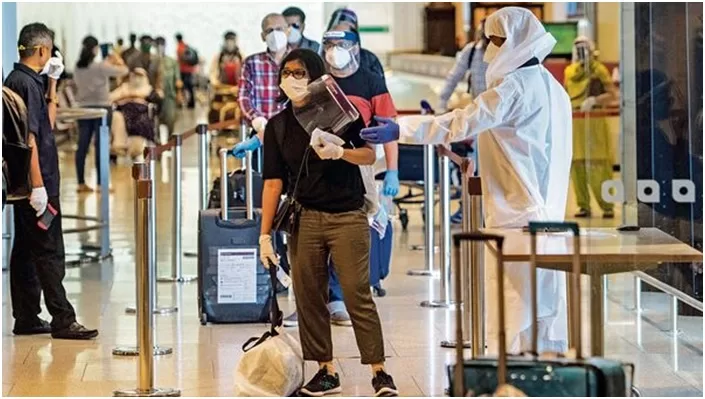Health
Singapore Takes Precautionary Measures Amid Rising Respiratory Infections and COVID Variants

Highlights
- Preventive Measures in Southeast Asia: Governments reintroduce measures due to rising respiratory infections, urging mask-wearing at airports (Singapore) and advising caution (Indonesia).
- Factors Contributing to Surge: Singapore cites waning immunity, increased travel, and festive interactions as causes for the spike in Covid cases.
- JN.1 Variant Dominance: JN.1, a sublineage, comprises over 60% of cases in Singapore, prompting increased vigilance.
- Guidance for Public: Indonesia advises travel postponement, vaccination completion, mask-wearing, and hygiene practices.
- Malaysian Situation: Despite doubled cases, authorities assert control, minimizing impact on healthcare.
- Reinstated Measures: Thermal scanners return at Indonesian border checkpoints to monitor and control the spread.
- Public Concerns: Heightened precautions evoke public worries, reminiscent of past drastic measures during the extended pandemic.
- Official Clarification: Singapore’s Deputy PM addresses misinformation about potential circuit breaker, aiming to allay public concerns.
- CDC’s Observation: CDC notes JN.1’s emergence suggests potential increased transmissibility or immune system evasion.
- Ongoing Challenges: The evolving situation highlights the sensitivity and caution in dealing with respiratory infections and Covid variants.
In response to the escalating spread of respiratory infections, including COVID-19, governments in Southeast Asia are reintroducing preventive measures. The Singapore government is urging individuals to resume wearing masks at airports, with temperature scanners in place. The objective is to curb the transmission of various germs, such as Covid variants, flu, pneumonia, and other respiratory pathogens, to alleviate potential stress on the healthcare system.
As the Ministry of Health in Singapore explains the surge in cases, factors such as waning population immunity, increased travel, and community interactions during the year-end travel and festive season contribute to the rise. Notably, the emergence of JN.1, a sublineage of BA.2.86, accounts for over 60% of COVID-19 cases in Singapore. Although classified as a Variant of Interest by the World Health Organization, there is currently no indication that JN.1 is more transmissible or causes more severe disease than other circulating variants.
Indonesia’s health ministry is advising Indonesians to postpone travel plans to areas experiencing a surge in COVID-19 cases, emphasizing vaccination completion, mask-wearing, hand hygiene, and staying home if feeling unwell. In Malaysia, despite a nearly doubled count of COVID cases in a week, authorities assert that the situation is under control and not causing significant strain on the healthcare system.
In response to the heightened precautions, Indonesian officials have reinstated thermal scanners at certain border checkpoints, including Batam ferry terminal and Jakarta’s main international airport. While these measures are aimed at controlling the spread of infections, concerns among the public have risen due to memories of past drastic measures during the prolonged pandemic in Asia.
Amidst the situation, Singapore’s Deputy Prime Minister Lawrence Wong clarified on social media that there is misinformation circulating about the government reinstating a circuit breaker. Meanwhile, the Centers for Disease Control and Prevention notes that the continued emergence of JN.1 suggests increased transmissibility or improved evasion of immune systems compared to BA.2.86 or JN.1. The evolving scenario underscores the sensitivity and caution with which governments and the public are navigating the ongoing challenges posed by respiratory infections and Covid variants.

















































